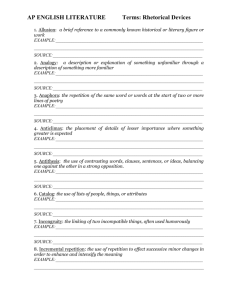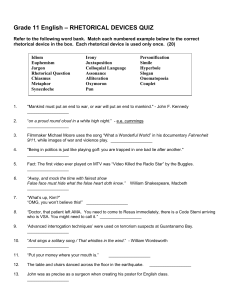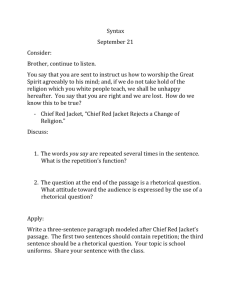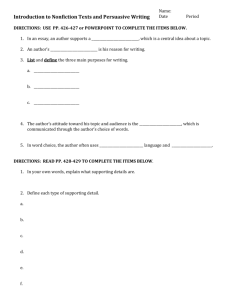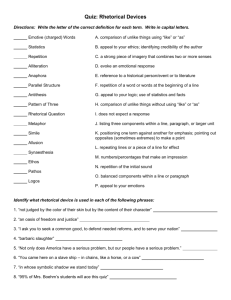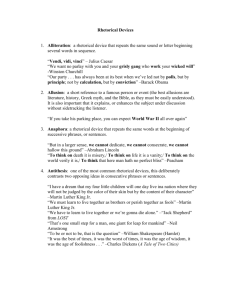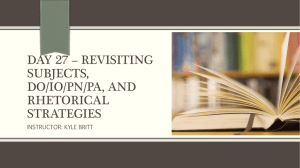AP English Language
advertisement
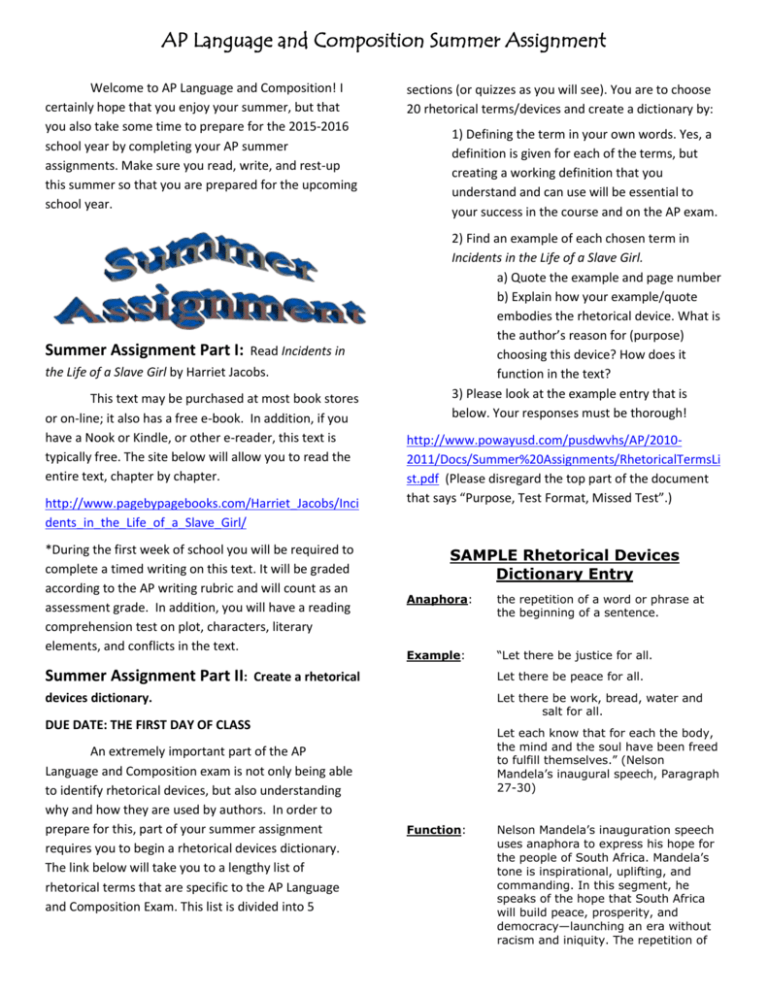
AP Language and Composition Summer Assignment Welcome to AP Language and Composition! I certainly hope that you enjoy your summer, but that you also take some time to prepare for the 2015-2016 school year by completing your AP summer assignments. Make sure you read, write, and rest-up this summer so that you are prepared for the upcoming school year. Summer Assignment Part I: Read Incidents in the Life of a Slave Girl by Harriet Jacobs. This text may be purchased at most book stores or on-line; it also has a free e-book. In addition, if you have a Nook or Kindle, or other e-reader, this text is typically free. The site below will allow you to read the entire text, chapter by chapter. http://www.pagebypagebooks.com/Harriet_Jacobs/Inci dents_in_the_Life_of_a_Slave_Girl/ *During the first week of school you will be required to complete a timed writing on this text. It will be graded according to the AP writing rubric and will count as an assessment grade. In addition, you will have a reading comprehension test on plot, characters, literary elements, and conflicts in the text. Summer Assignment Part II: sections (or quizzes as you will see). You are to choose 20 rhetorical terms/devices and create a dictionary by: 1) Defining the term in your own words. Yes, a definition is given for each of the terms, but creating a working definition that you understand and can use will be essential to your success in the course and on the AP exam. 2) Find an example of each chosen term in Incidents in the Life of a Slave Girl. a) Quote the example and page number b) Explain how your example/quote embodies the rhetorical device. What is the author’s reason for (purpose) choosing this device? How does it function in the text? 3) Please look at the example entry that is below. Your responses must be thorough! http://www.powayusd.com/pusdwvhs/AP/20102011/Docs/Summer%20Assignments/RhetoricalTermsLi st.pdf (Please disregard the top part of the document that says “Purpose, Test Format, Missed Test”.) SAMPLE Rhetorical Devices Dictionary Entry Anaphora: the repetition of a word or phrase at the beginning of a sentence. Example: “Let there be justice for all. Let there be peace for all. Create a rhetorical Let there be work, bread, water and salt for all. devices dictionary. DUE DATE: THE FIRST DAY OF CLASS An extremely important part of the AP Language and Composition exam is not only being able to identify rhetorical devices, but also understanding why and how they are used by authors. In order to prepare for this, part of your summer assignment requires you to begin a rhetorical devices dictionary. The link below will take you to a lengthy list of rhetorical terms that are specific to the AP Language and Composition Exam. This list is divided into 5 Let each know that for each the body, the mind and the soul have been freed to fulfill themselves.” (Nelson Mandela’s inaugural speech, Paragraph 27-30) Function: Nelson Mandela’s inauguration speech uses anaphora to express his hope for the people of South Africa. Mandela’s tone is inspirational, uplifting, and commanding. In this segment, he speaks of the hope that South Africa will build peace, prosperity, and democracy—launching an era without racism and iniquity. The repetition of AP Language and Composition Summer Assignment “Let there be” makes this section sound like a biblical command, creating inspiration to all who hear or read his speech and setting a mood of change. The anaphora reinforces that “peace,” “justice,” “work,” “bread,” “water,” and “salt” are essential to human rights, and the repeated word “let” suggests that these essential rights will now be permitted for all. Finally, by beginning the fourth sentence with “Let each know,” Mandela echoes the earlier commands, while asserting that these rights are no longer mere wishes: now, each man and woman in South Africa will have the opportunities so long denied to them. Through his use of anaphora, Mandela creates an inaugural speech that truly conveys the pride and possibilities he feels for South Africa upon his election. Summer Assignment Part III: WRITE and a) What did I know about writing before reading this book? b) What is my writing style? c) What do I now know about writing that I did not before? d) Choose one topic/concept from the book that made a real impact on you. What was it? Why did it affect you in this way? e) What will you change about your writing as a result of reading this book? I do not want to put too many parameters on this paper because I really just want to see how you write. I want to learn about your sense of style, as well as the level of your syntactical knowledge. The only requirements are: a) Answer all of the above questions b) Type the essay c) Write at least three pages, double-spaced. READ some more! Find a book about nonfiction writing. If possible, I would like you to purchase this book. I want it to be YOUR book. I want you to write in it: underline, highlight, and take notes in the margin. This can be any book about NF writing. Find something you want to read! (Some are listed below, but you are not limited to these). 1) Read the book. Annotate as you read. This means that you read with a “pen in hand”. If you are not sure what to annotate go to the link below. The purpose of annotating is to have an interaction with the book. When we write, we think; when we think, we learn (there is a rhetorical device somewhere in that statement ). How do I annotate? Go to this site: http://faculty.bucks.edu/specpop/annotate.htm …or this one from College Board (the organization responsible for AP) http://apcentral.collegeboard.com/apc/public/courses/ teachers_corner/197454.html 2) Write an essay that explains what you learned about writing as a result of reading this book. Some questions you will want to answer: ~On Writing by Stephen King (actually about fiction but there is a lot of good information in this book) ~Ernest Hemingway on Writing by Hemingway ~The Elements of Style by William Strunk available on-line) ~On Writing Well by William Zinsser ~Junk English by Ken Smith ~Sin and Syntax: How to Craft Wickedly Effective Prose by Constance Hale ~The Writer's Portable Mentor: A Guide to Art, Craft, and the Writing Life by Priscilla Long If you have any questions, feel free to email me. I will check it at least weekly. mpboyd@lf.k12.de.us

